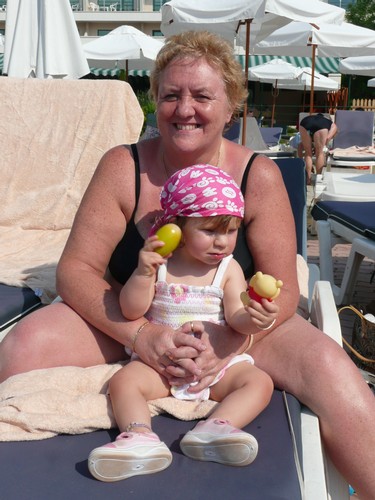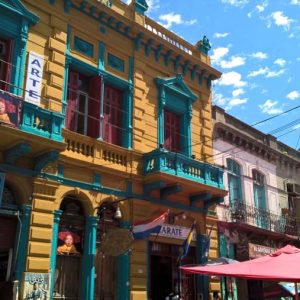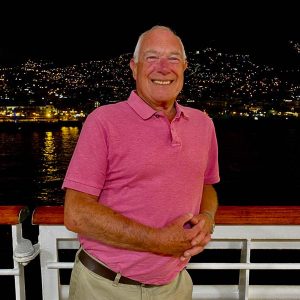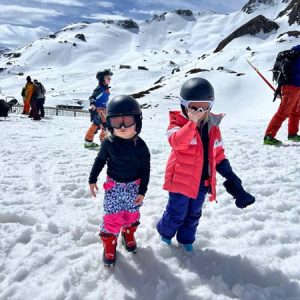Some of the loveliest holidays you can have when you are a little older, is travelling with your children and grandchildren, but when one of the children is disabled/ has additional needs it is a bit of a challenge too.
Lilly was 19 months old when we decided to have this family holiday, partially for my husband and I to be extra support for the family’s first foreign holiday since she was born. The selection of the hotel was more important than usual, as Lilly was just trying to get around and needed a walking frame, so we needed some space! Luckily we knew of people who had been to the Hotel Riu Evrika in Bulgaria’s Sunny Beach, and they felt it would fit the bill.
On a practical level, the hotel was quite suitable for the family, especially as the beach was just across a small road from the hotel, so we never had far to carry all the things we needed for a few hours on the beach. Naturally walking frames are out of the question on the beach, so it was back to the good old crawl – thank heavens for a lovely sandy beach! You can never get away from stairs in hotels, so a fully working lift is a necessity, and thankfully this was never a problem in the Evrika.
Getting out and about was not too much of a problem, as at 19 months Lilly was still in a push chair, but she is not a lover of crowds and busy places (we now know she is on the autism spectrum) so we deliberately avoided the kind of places that might cause her upset, as that in turn would upset others as she has a good pair of lungs on her! But Sunny Beach is lovely and flat with a large promenade, so it is ideal for getting around if you have difficulty walking, or need to use a wheelchair.
However it would be lovely to say everyone was accepting of Lilly and the fact she was a little different, but that didn’t happen then, it happens even less as she gets older. Children are wonderful and see things as they are, ask a direct question if they want to know, but some adults are a different story. Stares and nudges sadly are common place, and I did see one woman almost fall in the pool as she was looking so intently at Lilly walking carefully between the sunbeds with her walking frame! We really do need to educate our society in disability awareness and acceptance.
Challenges aside, holidaying with the grandchildren is a wonderful experience. It enables you to have all those fun times again, like silly games in the pool, rides in the funfair, building sandcastles on the beach, and paddling in the edge of the sea. Priceless memories, though you might come back needing another holiday!!
However 3 years down the line and now with a diagnosis, holidays abroad pose another problem – insurance! Affordable insurance for a child with a rare chromosome disorder, reduced mobility, poor eyesight and epilepsy is nonexistent, so that adds extra expense on the very stretched pocket of a disabled family.
I will never forget that holiday, I’m definitely ready for another one, and to take on the stares and prejudices that my little family cope with on a daily basis, and to shout out loud and proud – Lilly has 17q21.31 microdeletion syndrome, she’s an amazing little girl and I am so proud to be her grandma!
www.facebook.com/#!/pages/Lilly-Mae-Skidmore/169135555428
17q21.31 MICRODELETION SYNDROME
A 17q21.31 microdeletion is a very rare genetic condition in which a tiny piece is missing from one of the 46 chromosomes. The tiny missing bit increases the possibility of developmental and speech delay and learning difficulties. But there is quite a lot of individual variation.
The missing piece in 17q21.31 microdeletions includes four or five known genes and part of a sixth. The missing genes include MAPT, which plays a role in the functioning of the brain and the central nervous system. We do not yet know whether it is losing just a single gene such as MAPT or losing more of these genes that creates the difficulties that people with the 17q21.31 microdeletion syndrome face. Children and adults may look more like others with a 17q21.31 microdeletion than like other members of their family.
Seizures occur in more than half of the children but these usually seem to be well controlled with medication and some children outgrow them.
Brain scans in more than one in three showed wide ventricles (the fluid-filled spaces in the brain) or unusual features of the corpus callosum, the broad band of nerve fibres that links the two sides of the brain. A squint (strabismus) and long sight are also common.
For limited mobility and disabled holidays, Silver Travel Advisor recommends Enable Holidays.












